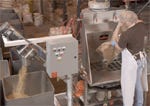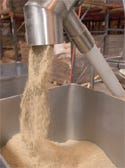Ingredient Screening Upgrade Boosts Pet Food Production, Cuts Labor, Improves Quality
October 8, 2009
Freshpet, a processor of high-end refrigerated dog food, replaced manual screening equipment it had designed, built, and installed, in order to clear a production bottleneck, reduce heavy lifting, and improve product quality.
Established in 2005 by dog lovers John Phelps and Scott Morris, Freshpet manufactures products under two brand names for nationwide distribution through approximately 3000 retailers. “Dog Rolls” are available in one- through six-pound chubs and “Fresh Bites” are meatballs for dogs. All of the products, which are marketed in supermarkets under the “Freshpet Select” brand and in specialty pet retailers under the “Deli Fresh” name, are made from fresh ingredients including chicken, carrots, peas, and rice. They contain no byproducts, fillers, or preservatives
DIY Screening
|
Mobile 30-in.-diam vibratory bag dump screener sifts dry ingredients prior to mixing them with meat protein. |
Freshpet sifts and screens dry ingredients to maintain particle-size uniformity, and remove clumps and incidental foreign material prior to mixing the ingredients with meat protein. The company’s maintenance staff had designed and built a 20 × 20 in. sifting screen that can handle about 10 lb of ingredients at a time, and an employee had to manually push the ingredients through the screen with a scraper. “Our guys went to a local box hardware store for the materials,” explains Michael Hieger, Freshpet’s general manager. “It was real do-it-yourself affair.”
“It was a sturdy little screen and kind of ingenious in its way, but we were having issues with small clumps in our dry ingredients. It would take us upwards of one hour to manually sift enough dry ingredients for one batch,” explains Hieger.
|
Screened dry ingredients are conveyed into a mobile bin that is wheeled to the processing side of the plant. |
The company decided to upgrade the screening process for this and several other reasons: it was forced to hire temporary help for screening when an employee could not be spared from another processing line; dry ingredients are supplied in 50-lb bags that are too heavy for some workers to lift and pour onto the screen; and ingredient uniformity. The manual process “did not produce the kind of uniformity we wanted in our dry ingredients,” explains Hieger. “The quality wasn’t there.”
From Hours to Minutes
Freshpet purchased a mobile, circular vibratory, bag dump screener from Kason Corp. that discharges into the feed hopper of a flexible screw conveyor. The screener is a Vibroscreen Flo Thru (low-profile) model with a single-deck, 30-in.-diam screen and built-in dust collector.
A worker now dumps a full bag of dry ingredients onto the screen that, at half the height of Freshpet’s homemade screener, reduces physical effort, while the dust-containment system improves safety and plant hygiene. The screener employs two imbalanced-weight gyratory motors, which are mounted externally on opposite sides of the screener, to impart multiplane inertial vibration that maximizes the rate at which particles pass through or across the screen surface. Material clumps and foreign material discharge through an “overs” discharge spout at the screen’s periphery, while on-size particles (≤ 5.66 mm) gravity discharge at a rate of 50 lb/min into a flexible screw conveyor that is 6 in. in diam, 6 ft long, and inclined at 45 degrees. Screened material is conveyed into mobile bins that are wheeled to the processing side of the plant for blending with proteins and cooking.
Mobility was important because the screening operation runs on an as-needed basis, and Freshpet wanted the option to use the space for additional purposes and to empty the area for washdowns between shifts.
“What used to take us an hour now takes 10–15 minutes, and one person can easily lift 50-lb bags to the height of the low-profile screener,” explains Hieger. “The efficiency gained by the system is such that Freshpet’s production would have to increase a large amount before the screening operation once again bottlenecked production.”
Kason Corp. (Millburn, NJ) manufactures vibratory, centrifugal, and static screening equipment for solids/solids and liquid/solids separations, and circular vibratory fluid bed processors. For more information, visit www.kason.com.
You May Also Like




